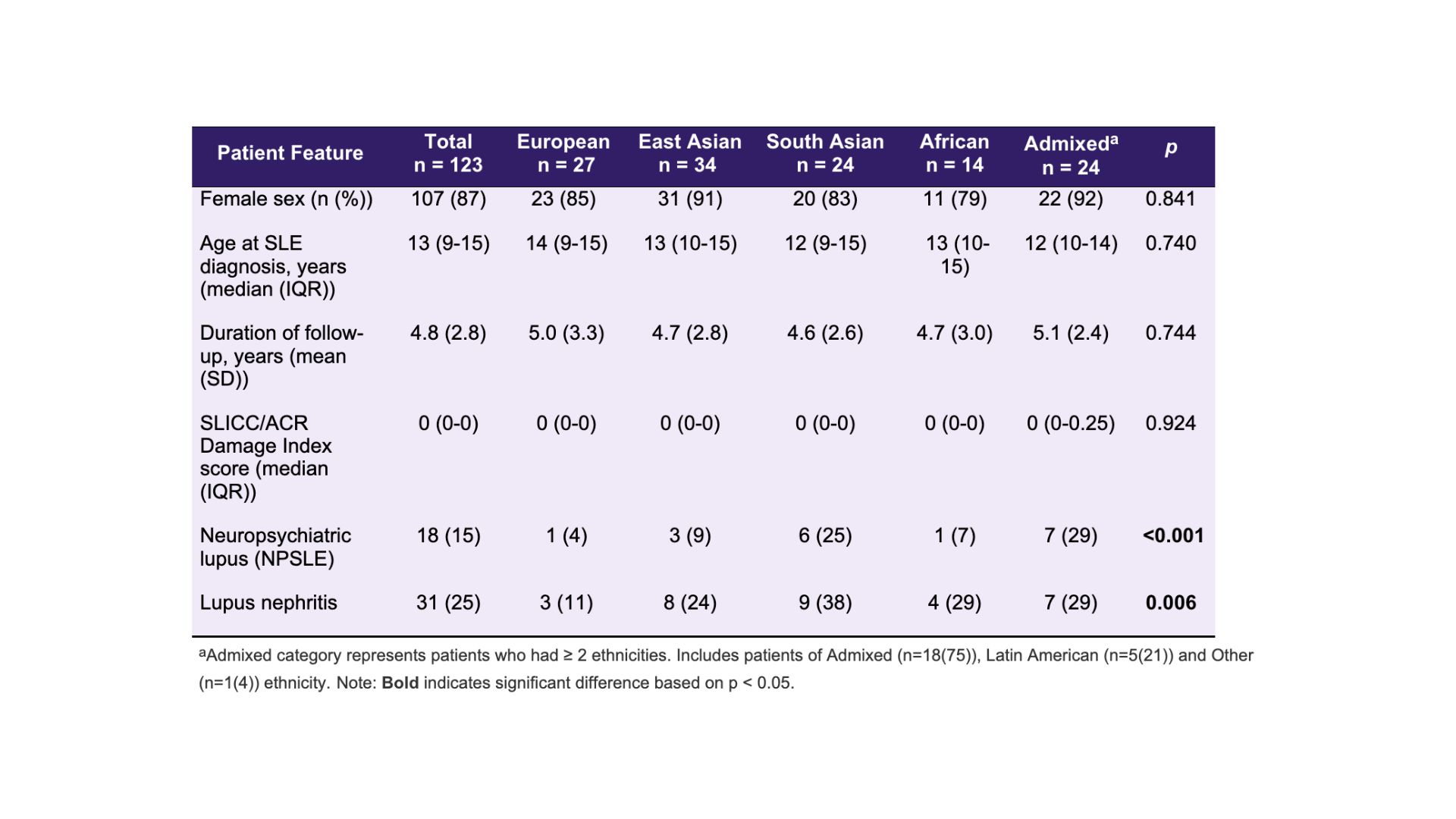Session Information
Session Type: Poster Session B
Session Time: 10:30AM-12:30PM
Background/Purpose: Patients with childhood-onset systemic lupus erythematosus (cSLE) face higher risks of depression and anxiety compared to healthy peers. In 2022, standardized mental health (MH) screening for depression and anxiety was introduced in the cSLE clinic to improve early intervention. While ethnic disparities in accessing MH care have been reported, they remain understudied in cSLE populations. This study examined ethnic differences in the prevalence of elevated symptoms and diagnoses of depression and anxiety among youth with cSLE pre- and post-implementation of standardized MH screening.
Methods: We completed a retrospective study of youth aged ≤ 18 years followed for SLE between January 1, 2000, to December 1, 2024. The cohort was stratified into two periods: pre-implementation (2000-2021) and post-implementation (2022-2024) of standardized MH screening. Ethnicity of patients was grouped into the following categories: European, East Asian, South Asian, African, Latin American, Indigenous American, Admixed (≥2 ethnicities), and Other. Elevated symptoms of depression and anxiety were identified by ever screening positive on any of the following questionnaires: Children’s Depressive Inventory (CDI score >13; CDI-2 score ≥20), Patient Health Questionnaire 9-item (PHQ-9 score ≥10), Multidimensional Anxiety Scale for Children (MASC score ≥48; MASC-2 score ≥88), and Generalized Anxiety Disorder 7-item (GAD-7 score ≥10). Diagnoses of depression and anxiety were identified by medical chart review. Univariate and multivariable logistic regression, adjusted for sociodemographic and clinical variables (age, sex, duration of follow-up, disease damage, neuropsychiatric SLE [NPSLE], lupus nephritis), assessed the association of ethnicity with screening outcomes and diagnoses of depression and anxiety.
Results: Among 610 charts reviewed, 560 patients had self-reported ethnicity data and were included in the study. This analysis focuses on 123 patients actively followed post-implementation of standardized screening, during which 109 patients completed both the PHQ-9 and GAD-7. The cohort was predominantly female (87%) with a median age at SLE diagnosis of 13 years (IQR 9-15). Majority of patients were East Asian (28%), European (22%), and Admixed (20%). NPSLE was present in 15% of patients and 25% had lupus nephritis. Ethnicity was not significantly associated with screening completion, screening positivity, or diagnoses of depression or anxiety. In adjusted models, NPSLE was significantly associated with screening positive on the PHQ-9 (OR = 15.45, CI: 3.07-77.82, p = < 0.001) and receiving a depression diagnosis (OR = 13.76, CI: 2.55-74.22, p = 0.003). No significant associations were found between demographic and clinical variables and anxiety-related outcomes.
Conclusion: In a large multiethnic cohort of youth with cSLE, we did not observe an association between ethnicity and MH screening or a diagnosis of depression and anxiety. NPSLE was significantly associated with screening positive on the PHQ-9 and receiving a depression diagnosis. Further analyses will assess psychotropic medication use by ethnicity and extend findings to the pre-implementation period.
 Table 1. Demographic and clinical features of patients followed for cSLE post-implementation of standardized mental health screening (n=123)
Table 1. Demographic and clinical features of patients followed for cSLE post-implementation of standardized mental health screening (n=123)
.jpg) Table 2. Univariate and multivariable-adjusted odds ratios for association between ethnicity and (1) ever screening positive on the PHQ-9 and (2) screening positive on the PHQ-9 and receiving a depression diagnosis (n=109)
Table 2. Univariate and multivariable-adjusted odds ratios for association between ethnicity and (1) ever screening positive on the PHQ-9 and (2) screening positive on the PHQ-9 and receiving a depression diagnosis (n=109)
.jpg) Table 3. Univariate and multivariable-adjusted odds ratios for association between ethnicity and (1) screening positive on the GAD-7 and (2) screening positive on the GAD-7 and receiving an anxiety diagnosis (n=109)
Table 3. Univariate and multivariable-adjusted odds ratios for association between ethnicity and (1) screening positive on the GAD-7 and (2) screening positive on the GAD-7 and receiving an anxiety diagnosis (n=109)
To cite this abstract in AMA style:
Tran A, Das I, Ding Z, Dominguez D, Kronenberg S, Ng L, Toulany A, Zai G, Levy D, Knight A, Hiraki L. Ethnic Disparities in Mental Health Screening, Diagnoses, and Outcomes in Patients with Childhood-Onset Systemic Lupus Erythematosus [abstract]. Arthritis Rheumatol. 2025; 77 (suppl 9). https://acrabstracts.org/abstract/ethnic-disparities-in-mental-health-screening-diagnoses-and-outcomes-in-patients-with-childhood-onset-systemic-lupus-erythematosus/. Accessed .« Back to ACR Convergence 2025
ACR Meeting Abstracts - https://acrabstracts.org/abstract/ethnic-disparities-in-mental-health-screening-diagnoses-and-outcomes-in-patients-with-childhood-onset-systemic-lupus-erythematosus/
